Christmas and the holiday season can come with a lot of uncertainty, change and extra socialising, which can make it a difficult time for some autistic young people. The lights, sounds, smells and social expectations can result in a lot of extra processing for your brain. While some people may find some of these things wonderfully stimmy, others may find they feel overwhelmed and anxious.
“I think the fact that it’s everywhere is overwhelming. Every shop you go to will have christmas themed stuff everywhere and most likely christmas music, schools have christmas decorations, christmas themed lessons, and other things like that, christmas songs are all over the radio and it’s all so overwhelming”
The social expectations and traditions of Christmas and other holidays often don’t make much logical sense, especially if you find some aspects distressing or upsetting. It can be difficult if you feel pressured to enjoy something, but you don’t actually find it ‘fun’.
“We always open presents one by one in front of everyone and I find that very stressful as the pressure of having to like the gift is too much”
“I don’t like having to eat certain food for Christmas dinner, I don’t understand why I can’t just eat food I actually like!”
To help with some of these struggles, here are some thoughts and ideas from the young people at Spectrum Gaming on how to survive the festive season:
Lights & Decorations:
If you struggle with bright lights, even in winter, then wearing sunglasses when you have to be near them can be helpful. If you live in a neighbourhood with a lot of outside decorative lighting you might find a blackout blind or curtains can help with reducing the amount of light coming into your bedroom.
Some people can struggle with the house being decorated (or un-decorated!) all at once, as this is a big visual shift to get used to. If you do decide to decorate (you don’t have to!), you might like to decorate little-by-little, or in just one area or room of the house so it feels less overwhelming. You could take down decorations gradually as well, or you might decide that there are some decorations that you would like to keep up for longer, or not take down at all.
Food & Mealtimes:
The festive season often comes with the expectation to indulge in traditional meals. While some people might really enjoy trying all the different foods at this time of year, you may prefer to stick to your safe foods. It can be helpful for your family to stock up on these for the holidays, so that you know there will be something you can eat if you don’t like some of the other food that might be offered.
Unusual or new smells can also be a problem at this time of year and for mealtimes in particular. It could be helpful to ask if you can eat your meal in a different room if there is a smell you don’t like, or to have something nice-smelling close to you if you cannot leave the environment.
Receiving Presents & Surprises:
Sometimes even being asked what you want for Christmas can feel overwhelming. You might find that having too much choice means that it can be difficult to make a decision, which can feel really stressful. Autistic people usually like to carefully consider all the options before making a decision, so you might struggle if someone ‘puts you on the spot’ to come up with ideas for gifts. If possible, it can help to ask relatives for money instead, so that you can buy something that you really want or need after you have had more time to think about it.
It can be really common to struggle with surprises and you might prefer to know what you are receiving as presents. Uncertainty can be a big cause of anxiety for autistic people and while gift-giving traditionally involves surprises, it doesn’t make much sense for people to do something that upsets you if they are trying to do something nice! You could also ask that presents are given to you unwrapped, or ask a parent/carer to pre-unwrap them, so you can clearly see what they are.
For Advent Calendars it can be helpful to have one that is the ‘same’ every day, such as a chocolate one, or to be able to fill a reusable calendar yourself, so you know what is coming up each day.
When it comes to opening presents, you might find that you struggle with people watching you. If it feels uncomfortable for you, it could be a good idea to open your presents away from other family members, such as in a safe space like your bedroom. It can be common when receiving a surprise to dislike the gift; sometimes this can be because the gift just isn’t suitable, but often the feeling of dislike comes from it being something that was unexpected, and then you may end up liking the item after having some time to get used to it.

Socialising & Expectations From Others:
Big gatherings can be common at this time of year and they might leave you feeling really drained, especially if you are spending a lot of time masking. Sometimes extended family can have different expectations of how you should behave and may also have less understanding of you, or autism generally, than the people you usually socialise with.
It is totally okay to say ‘no’ to events and activities that you don’t want to do or would find distressing. In fact, some activities may feel impossible if you are in burnout. It can help to explain to a parent/carer if you are worried about attending an event or gathering, so they can support you in either making adaptations or declining invitations when needed. It’s also okay to say ‘no’ to any expectation to hug, kiss or talk to any relatives if you do not want to do that and it makes you feel uncomfortable or anxious. Explaining this to the adults who know you best can be helpful, so they can support you in declining any unwanted contact or interaction.
If you do want to attend lots of social events it is important to try and find time to recharge between them. It may be better if you can spread out visiting friends and relatives over a few days or weeks, rather than seeing a lot of people in a short period of time.
It can be helpful to set up a safe space or room to retreat to if a gathering gets too overwhelming. The space could have favourite plushies or other comfort items and things to help you regulate, such as fidgets. It can be a good idea to make others aware in advance that this is your safe space and that others should not enter unless you have agreed that they can. You could write a message explaining this, or you could ask an adult to help explain this to others on your behalf. You could also have a way to signal to a parent/carer that it is time to leave somewhere if it feels like too much or you change your mind.
Noise cancelling headphones playing music you like can be really useful while out and about (to drown out all the annoying Christmas music in shops!), or to help reduce the impact of noisy environments like a busy family gathering and to help you regulate.
Changes to Routine:
There might be lots of changes to your usual routine which can be difficult to manage. If you attend school, there are often events such as shows (with rehearsals!), parties, non-uniform days and times where you do something like watch a movie instead of your usual lesson. Your family may also want to take you to things like ‘Christmas light switch ons’, pantos, grottos and other things. While the adults may intend these things to be fun, they can also often be really overwhelming and the uncertainty of what is happening or what you are expected to do can be a lot to think about and process.
It could be helpful for people to give you as much information as they can about any changes to your routine, and let you ask lots of questions so that you can feel sure you understand and to help reduce anxiety. It can also be a good idea to still include as much of your usual routine as possible in between any special activities.
Autistic Friendly Festivities:
Here are some examples of what Christmas looks like for some autistic young people, and the things their families do that they find helpful:
“I think that being able to take part in family traditions but also having the option to not take part is great, as well as always having a quiet room to go in and get away from the noise, smell and busyness. Having presents that are able to be sent back helps remove the pressure of having to like them”
“I recommend sitting in a cardboard box. Won’t help, but it’s fun!”
“I used to love Christmas eve with my family because we would play board games and have music playing, and it would be like Christmas but without everybody else. I also used to love the routine of waking up at my Nanny’s house and spending the whole day there”
“If I am finding the family gathering overwhelming I know that my room is a safe space, where only my mum and dad can enter. I am invited to take part as much as I would like to – but there is no pressure, and my family know not make a fuss if I do come down because I hate that!”
“At Christmas dinner I am allowed to watch YouTube with headphones on, this helps with all the noise of people eating and talking so that I don’t get stressed out and I can still enjoy being with everyone”
“Toning it down a little. Make the lights less bright, less adverts that are pushed in your face, less surprises, that kind of stuff can help significantly”
One of the main things to remember is that people should respect you if you say that you are struggling and where possible try and support you and meet your needs. Just because something is ‘traditional’ doesn’t mean that it needs to be done. You and your family can create new traditions and discover new ways to embrace the spirit of the season with hopefully less of the stress!
A Collaboration Between:
Kirstie McStay, Autistic Parent, Under 13 Community Manager at Spectrum Gaming
Young People at Spectrum Gaming



